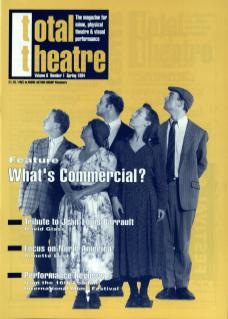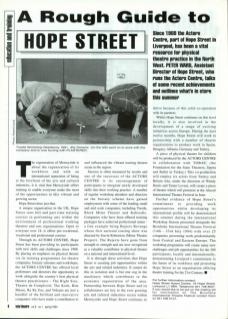The regeneration of Merseyside is about the regeneration of its workforce, and with an international reputation of being at the forefront of the arts and cultural industries, it is vital that Merseyside offers training to enable everyone to make the most of the opportunities in this vibrant and growing sector.
Hope Street does just that. A unique organisation in the UK, Hope Street runs full- and part-time training courses in performing arts within the environment of professional working theatres and arts organisations. Open to everyone over eighteen, it offers pre-vocational, vocational and professional courses.
Through its Actors Centre, Hope Street has been providing its participants with new skills and challenges since 1988. By placing an emphasis on physical theatre via its training programmes for theatre companies, bursary schemes and workshops, the Actors Centre has offered local performers and directors the opportunity to work alongside the country's best physical theatre practitioners – The Right Size, Theatre de Complicité, The Kosh, Bim Mason, Ra-Ra Zoo, and Volcano are just a handful of the brilliant and innovative companies who have made a contribution to and influenced the vibrant touring theatre scene in the region.
Success is often measured by results and one of the successes of the Actors Centre is its encouragement of participants to integrate newly developed skills into their working practice. A number of regular workshop attenders and directors on the bursary scheme have gained employment with some of the leading small- and mid-scale companies, including Trestle, Black Mime Theatre and Kaboodle. Companies who have been offered training packages have achieved professional status – a fine example being Rejects Revenge whose first national touring show was directed by Gavin Roberston (Mime Theatre Project). The Rejects have gone from strength to strength and are now recognised as a valuable contributor to physical theatre on a national and international level.
It is through these activities that Hope Street is creating job opportunities within the arts and related industries. It cannot do this in isolation and is but one cog in the machinery which contributes to the economic regeneration of the area. Partnerships between Hope Street and its collaborators are key to the ever growing arts and cultural industries sector within Merseyside, and Hope Street continues to thrive because of this solid cooperation with its partners.
Whilst Hope Street continues on this level locally, it is also involved in the development of a range of exciting initiatives across Europe. During the next twelve months, Hope Street will work in partnership with a number of theatre organisations to produce work in Spain, Hungary, Albania, Germany and Turkey
A piece of physical theatre for children will be produced by the Actors Centre in collaboration with TOBAV (the Foundation for the State Theatres, Opera and Ballet in Turkey.) This co-production will employ six actors from Turkey and Britain who, under the direction of Wendy Harris and Tamer Levent, will create a piece of theatre which will premiere at the Alacati International Theatre Festival in June.
Further evidence of Hope Street's commitment to providing work opportunities whilst developing its international profile will be demonstrated this summer during the International Workshop Season presented alongside the Brouhaha International Theatre Festival (14-23 July 1994) with over 25 companies presenting work predominantly from Central and Eastern Europe. The workshop programme will create many new challenges and job opportunities for the 200 participants, locally and internationally, demonstrating Liverpool's commitment to the future of its workforce and promoting Hope Street as an organisation offering theatre training for the 21st Century.

